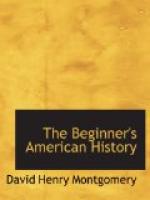Who was Lord Baltimore, and what did he try to do in Newfoundland? How were Catholics then treated in England? What did the king of England give Lord Baltimore in America? What did the king name the country? What was Lord Baltimore to pay for Maryland? What did the king promise Lord Baltimore? What did Lord Baltimore’s son do? When and where did the emigrants land? What did they call the place? What is said about the Indians? Of what was Maryland the home? Why did some of the people of Virginia trouble them? What is said of the city of Baltimore? What is said of the Revolution?
ROGER WILLIAMS
(1600-1684).
82. Roger Williams comes to Boston; he preaches in Salem and in Plymouth; his friendship for the Indians.—Shortly after Governor John Winthrop and his company settled Boston,[1] a young minister named Roger Williams came over from England to join them.
[Illustration: THE CHURCH IN WHICH ROGER WILLIAMS PREACHED IN SALEM. IT IS STILL STANDING.]
Mr. Williams soon became a great friend to the Indians and while he preached at Salem,[2] near Boston, and at Plymouth, he came to know many of them. He took pains to learn their language, and he spent a great deal of time talking with the chief Massasoit[3] and his men, in their dirty, smoky wigwams. He made the savages feel that, as he said, his whole heart’s desire was to do them good. For this reason they were always glad to see him and ready to help him. A time came, as we shall presently see, when they were able to do quite as much for him as he could for them.
[Footnote 1: See paragraph 73.]
[Footnote 2: Salem (Sa’lem).]
[Footnote 3: See paragraph 68.]
83. Who owned the greater part of America? what the king of England thought; what Roger Williams thought and said.—The company that had settled Boston held the land by permission of the king of England. He considered that most of the land in America belonged to him, because John Cabot[4] had discovered it.
But Roger Williams said that the king had no right to the land unless he bought it of the Indians, who were living here when the English came.
Now the people of Massachusetts were always quite willing to pay the Indians a fair price for whatever land they wanted; but many of them were afraid to have Mr. Williams preach and write as he did. They believed that if they allowed him to go on speaking out so boldly against the king that the English monarch would get so angry that he would take away Massachusetts from them and give it to a new company. In that case, those who had settled here would lose everything. For this reason the people of Boston tried to make the young minister agree to keep silent on this subject.
[Footnote 4: See paragraph 22.]
84. A constable is sent to arrest Roger Williams; he escapes to the woods, and goes to Mount Hope.—But Mr. Williams was not one of the kind to keep silent. Then the chief men of Boston sent a constable down to Salem with orders to seize him and send him back to England. When he heard that the constable was after him, Mr. Williams slipped quietly out of his house and escaped to the woods.




